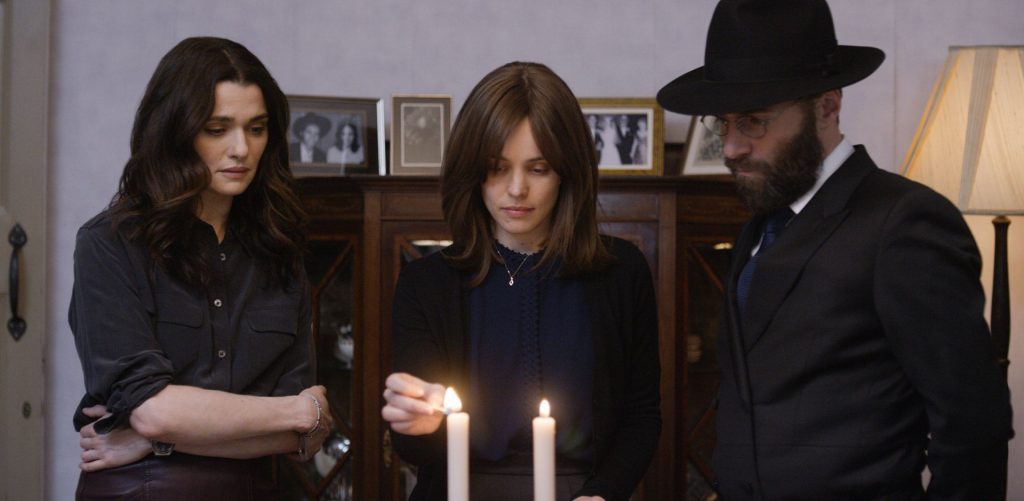Director Sebastian Lelio on Capturing Forbidden Love in his Urgent new Film Disobedience
Director Sebastian Lelio has had quite the exciting past few months. Lelio’s last film, A Fantastic Woman, about a transgender woman whose partner tragically dies, swept the awards circuit. It won 17 awards including the Academy Award for Best Foreign Film—which was the first Chilean film to do so. Right now, there’s no stopping Lelio and his work.
In theaters today, Lelio is tackling another story about women’s interior lives. Disobedience, starring Rachel Weisz and Rachel McAdams, is the story about a forbidden love between two women, Ronit (Weisz) who long ago left the Orthodox community she grew up in and Esti (McAdams) who has married their childhood friend Dovid (Alessandro Nivola), a rabbi. Esti has deeply repressed her sexuality. When the two are brought together again under tragic circumstances, their passion is reignited. Leilo crafts a quietly fiery story between the fantastic pairing of Weisz and McAdams—full of side glances and shared cigarettes until those stolen moments reach their breaking point. Lelio sat down with The Credits before Disobedience Tribeca Film Festival premiere to talk about that pivotal sex scene, telling women’s stories and his upcoming remake of Gloria starring Julianne Moore.
Why did you want to tell the story of Disobedience?
Well, I felt immediately connected to this very particular triangle. I found it very original and special, the fact that they are lovers and friends and they have grown together and Ronit escaped, and she comes back and everything happens again. So, I was just very attracted to the idea of these human beings that are in flux and vibrating, making mistakes. They felt very human, and operating in front of a backdrop of ideas that are more or less fixed. That creates a great tension. And then the fact that Rachel Weisz was going to play Ronit was also one of the big factors that made me say yes quite quickly.
You mention about the characters being in flux, was that one of the reasons why Ronit’s sexuality is never really defined? We know she’s in love with Esti but earlier in the film, she’s having sex with that man in the bathroom out of… grief? Was that purposeful?
Everything has a purpose. [laughs] It’s interesting to play with the amount of information you give, and in this case, we don’t really know. I mean, of course she could be bisexual, but maybe she’s been only with Esti. We don’t know. At some point, she answers, “and you, have you been with other women?” and she says, “not really.” What does that mean? You know, not really means yes, but it hasn’t been like this with you. It’s unclear, and it’s nice that it’s like that.
It’s a film that’s told through such subtle gestures. It reminded me so much of Carol, and all of the long glances between Rachel and Rachel, was that something you worked extensively to portray?
I just love that, and tried to capture that in film. I think it’s a way of working with the actors. I let them get lost. It’s a relationship built on trust, so they know that they can explore, they can get lost, they can be foolish, and knowing that I will be careful and take care of them in the editing room and try to create, or to rescue as much subtlety as possible.
I read that interview that Rachel Weisz did recently about how much she collaborated on the very pivotal sex scene between Ronit and Esti with you. How was it collaborating to make sure that the scene accomplished everything it should accomplish and through a female gaze?
Well, I think there’s bit of a misunderstanding in that because that article implied that Rachel was there in the editing room, which wasn’t the case. We discussed that scene a lot, it was a gradual process. I knew that [it] was in a certain way, the heart of the film. I wanted it to be very intense and erotic but without nudity. So, it was about finding the specificity of what they do and then I drew the entire scene, so it was storyboarded, so we all knew which stations were going to be. And we were all in agreement, and then in the editing room it’s always the same: you take out, and take out, and take out until you can’t take anything else out.
You tell a lot of women’s stories that I don’t think get told, and I was wondering why is that something that you feel like you’re so drawn to in your work?
I feel moved by the idea of taking these characters that are somehow on the fringes of either narrative or society and put them in the absolute center, and create these hopefully complex portraits where you can see many aspects of them and see them going through the entire emotional spectrum.
What can you say about your English language version of Gloria? I’m so interested to see how it’s going to translate to Julianne Moore in L.A.
Well, it’s been a very joyful process. I really wanted to make A Fantastic Woman and Disobedience before revisiting my own film again, but it was wonderful to find a new vehicle to whatever was universal in this story, and especially to tell that story again now, after the world changed. A story about a woman that claims her right to keep dancing, so to say, became suddenly urgent again.
Featured image: L-r: Ronit (Rachel Weisz), Esti (Rachel McAdams) and Dovid (Alessandro Nivola). Courtesy Bleecker Street Media.




